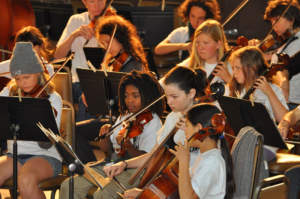Music education is crucial for the holistic development of children, as it offers a wide range of benefits that impact their cognitive, emotional, social, and creative development. Here are some key reasons why music education is important for children:
- Cognitive Development: Music education has been linked to improved cognitive skills in children. Studies have shown that children who receive music education tend to have better spatial-temporal skills, which are crucial for mathematics, science, and engineering. Music also helps children develop their memory, attention, and listening skills, which are transferable to other areas of learning.
- Emotional Development: Music has the power to evoke emotions and can be a tool for children to express themselves. By learning music, children can develop emotional intelligence, empathy, and self-awareness. Music can also serve as an outlet for emotional expression, helping children manage stress, anxiety, and other emotions in a healthy and constructive way.
- Social Development: Music is often a collaborative art form that requires teamwork, communication, and cooperation. Through music education, children learn to work together as a group, develop social skills, and build relationships with their peers. They also learn to appreciate different cultures and traditions through exposure to diverse musical genres, promoting cultural understanding and acceptance.
- Creativity and Self-Expression: Music education encourages children to explore their creativity and express themselves in a unique way. It fosters imagination, innovation, and critical thinking skills. Children can experiment with various musical instruments, styles, and techniques, allowing them to find their own voice and develop their artistic identity.
- Fine Motor Skills: Learning to play a musical instrument requires precise control of fine motor skills, such as finger movements, hand-eye coordination, and breath control. These skills are transferable to other areas of life, such as handwriting, sports, and everyday tasks, and can enhance overall dexterity and coordination in children.
- Personal Growth and Discipline: Music education requires practice, patience, and perseverance. Children learn the value of hard work, discipline, and dedication to achieve mastery of an instrument or musical piece. These qualities can translate to other areas of life, such as academics, sports, and personal goals, fostering a growth mindset and a strong work ethic.
- Appreciation of Arts and Culture: Music education exposes children to different musical genres, styles, and traditions from around the world. It helps them develop an appreciation for various forms of art and culture, broadening their horizons and nurturing their aesthetic sensibilities.
In conclusion, music education is crucial for the overall development of children, providing them with cognitive, emotional, social, and creative benefits. It equips them with essential skills that can be transferable to various aspects of life, fostering personal growth, self-expression, and appreciation for arts and culture. Music education plays a vital role in nurturing well-rounded individuals and enriching their lives.
